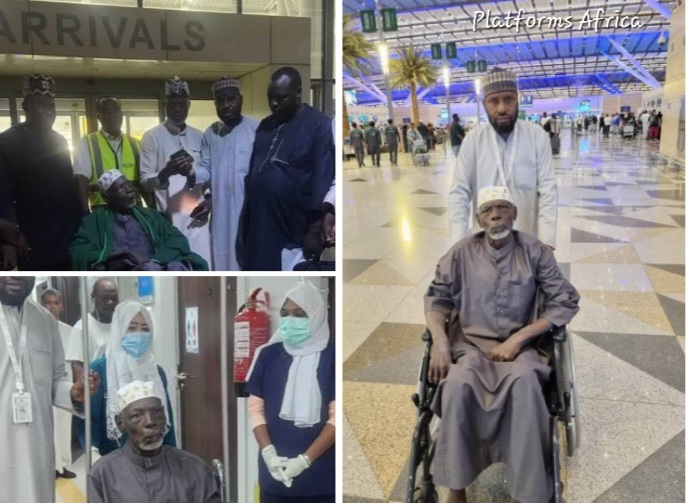Tips on how to manage psychological trauma that passengers usually experience during heavy turbulence in a flight, and why airlines usually insist cellphones are switched off during take off and landing, as given by an aviation expert, Dr Dayo Kayode, during Platforms Africa weekly e-Discourse.
What is the state of aviation industry in Africa?
The state of this industry is like others in Africa.
A situation whereby the governments in Africa have refused to choose their priorities right while also not allowing industries to thrive through corruption.
We can imagine what is presently happening to both Aero Air and others within the Nigeria space.
Aside Ethiopian Airlines, there is relatively an absence of mega aviation giants on the continent. Why?
We can look at this from the perspective of lack of proper business initiatives as well as lack of trust among both operators on one hand and governments on the other.
Imagine if Nigerian Airways of that have formed an alliance with say Ethiopian Airways, what would have happened to Ethiopian Airways by now? Very unserious people dominates the aviation environment in Africa; unlike alliances been formed among airlines in Europe and other better climes.
I think not until Africans can bring seriousness and conceptualisation to their businesses especially aviation, the story will always be the same.
What has come of AfTAC that was proposed some years back?
Very appalling environment to do good business
The COVID-19 pandemic rocked the sector and altered its dynamics. What areas of the industry will you say had the biggest hit?
Please you can take this up: The COVID-19 pandemic rocked the sector and altered its dynamics. What areas of the industry will you say had the biggest hit?
Aviation is a systemic industry whereby an effect on a section will affect other sub-systems completely.
With covid-19, there was a total ban on air travel hence, no agency can sell tickets, no one can export cargo while there weren’t any passenger to convey and consequently, airport operations were equally suspended.
That is, the dynamics of all the areas were equally affected including training.
When the virus started subsiding, just as air travel was being gradually lifted, each of the sectors of the industry also started seeing life as they are all intertwined and interdependent.
There have been hikes in the cost of flights tickets. Is the cost of aviation fuel the reason?
Absolutely.
The reason being adduced to Russia-Ukraine conflict.
This shouldn’t have been in the first instance if African leaders (especially Nigeria) have been proactive enough to be refining their crude within the soils of Africa.
If this has been so, how will this war be affecting the economy of Africa; what will concern us about vessel’s movement on the mediterranean sea?
This should be a wake up call to our African leaders
Some aviation companies have been taken over by Asset Management Corporation of Nigeria (AMCON) due largely to poor management of locally-owned aviation businesses. Ghana Airways went down long ago, and attempts to revive it have failed. In the face of these challenges, can Africans run a successful aviation business?
Yes Africans can but only if:
1- Round pegs are being allowed in round holes in terms of who does what, when and where. While such are being allowed free hand to do the job.
2- If corruption can be eradicated.
3- If the business is been properly conceptualized in terms of putting in place *the necessary frameworks that will ensure business sustainability* Imagine the Nigeria Aviation minister unveiling a Nigeria airline in UK some years back in a vacuous framework – no shareholders, no permanent address, no website, no call sign, no nothing. And what do we have today?; all that whole money spent has went down the drains….. what a conduit pipe to syphon our commonwealth…….this has been same story all over Africa.
Perhaps, Africans should contract out the whole industry to both Ethiopian, Kenyan and SA Airways to run.
Has the hike in fares impacted the number of Air travellers (patronage) in any way?
Oh yes.
Like for me now, it has reduced my travels so also some other people on this platform that I know.
What is this things with switching off phones during take-offs and landing? Passengers can just put their phones in flight modes, can’t they?
Many decades ago, aviation authorities required that phones were switched off on flights because they could interfere with signals on the plane or on the ground. Some crew members noted that when a passenger switched on their phone, there was a loss of signal in the cockpit or some instruments malfunctioned. There were also concerns that cell phone signals could interfere with systems on the ground (at the airport) which could affect aircraft communication.
Sometimes, these claims were confirmed by studies and other times they were not. In 2016, the US Federal Aviation Administration commissioned a thorough study of cell phone interference. The summary of their study was:
There is no proof that cellphones cause any interference on the aircraft or on the ground.
This also meant that there was no proof that the cellphones DID NOT cause any interference. The authorities decided to err on the side of caution and retain instructions to passengers to keep their phones off, especially during the most critical times of take-off, landing and taxiing. Afterall, in the rare occasion that a plane accident occurs, almost 63% of accidents will happen during the take-off or landing phase.
I’m sure you’re rolling your eyes because there are times when you forgot to turn off your phone and nothing happened or for those of you who don’t like instructions, you may have left your phone on just to see what happens. For others, you may have queued up your favorite shows on Netflix or YouTube while looking forward to binge-watching on your flight. Well…
In the last few years, more and more authorities have certified that cell phones do not pose enough of a risk to be turned off during flight. For instance, in 2014, the European Aviation Safety Agency (EASA) gave airlines permission to decide whether or not to allow the use of cell phones during take-off, landing and taxiing as long as the phones are on airplane mode. Airplane mode effectively shuts down the transmissions that may or may not cause interruptions in aircraft communication.
However, because of how crucial flight safety is, many airlines have kept the century-old practice of asking passengers to turn off their cellphones or use them in airplane mode. If an airline has the authority to determine the rules onboard, you do not want to disobey the instructions of the crew or you could be kicked off the flight. Also, many airlines provide in-flight entertainment for long-haul flights to keep you busy.
You may even have access to free or paid in-flight WiFi to help you stay connected to the world, once your craft has reached cruising altitude.
For most airlines, these rules allow them comply with federal, regional or other safety authorities. For others, it is good practice to ensure that passengers do not interrupt the flight experience of their fellow passengers due to loud and long calls over the phone. So, either way, you’ll either enjoy a silent flight, a safe flight, or both!
Whatever you do, and no matter how often you fly, make sure you listen to the instructions before each flight and do exactly what the particular airline tells you to do.
Have you ever wondered why these rules were in place? Will you be keeping your phone on (on airplane mode) where it is allowed or would you rather stick to the in-flight entertainment?
Because in Nigeria we have no standards, anything goes.
Corruption of our leaders whereby they take ‘egunje’ from these operators both local and international. This I called the ‘egunje’ syndrome in our aviation industry.
Are you aware of a particular aviation minister that a particular foreign airline built houses for in UK so that an unholy alliance can be formed between that airline and our own national carrier? This was an airline that was about to be declared bankrupt in about three days. What has come of that alliance today; has that foreign airline not used the alliance to bounce back?
So you can imagine how our leaders through their hedonistic tendencies coupled with their khakistocratic cum idiotic thinking are using these to kill our not only aviation industry but our entire system.
This situation can only be stopped when we the people realises that: when we refuse to emancipate ourselves, we will remain perpetually emaciated.
QED
Finally, What is turbulence during flights? How can one prepare psychologically to manage them?
Turbulence occurs when an airplane hits a strong wind current that can push or pull the plane. Most commercial airplanes fly very high to avoid this.
During flights, turbulence can be caused by various environmental factors which mostly can be adduced to atmospheric pressure changes known as thermal eg heat of the sun, some hot air, rise or interact with current winds in flight which can cause bumpy ride.
There could also be turbulence from other aircraft flying – the essence of a set of rules stating the minimum distance between two flying jets.
It could also be caused by variations in speed of wind on ground hence the lower altitude turbulence and few more others that can’t be detailed because of our time.
however, there are some onboard weather radar that always highlight these occurrences before hand for the pilot to avoid coupled with the flight plans which would have been prepared by NIMET before departure of especially the long haul flights indicating where to likely expect turbulence and other air obstructions All of these allows the pilot to avoid such and where it couldn’t, must have been the best option decision as turbulence don’t affect the passengers alone but inclusive of the crew.
though turbulence is responsible for a third of all weather related aircraft accidents/incidents (according to research), pilots are well trained to handle such situations while airplanes are being built to withstand such rough situations.
Essentially, turbulence is not something so scary as it is a normal occurrence within air travel just as you can not avoid bumpy roads on nigerian roads.
This edition of e-Discourse, a weekly event organised by Platforms Africa, a forum created by award-winning African journalist, Adeola Yusuf, is moderated by Accra, Ghana-based veteran journalist, Francis KOKUTSE





